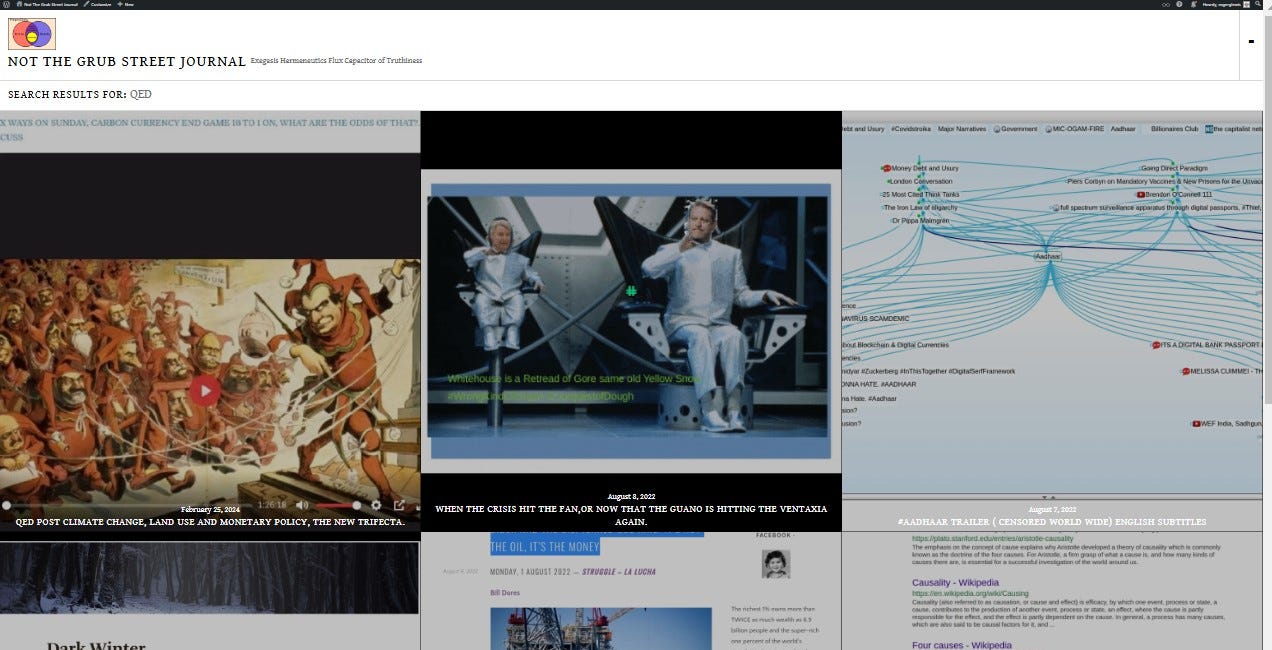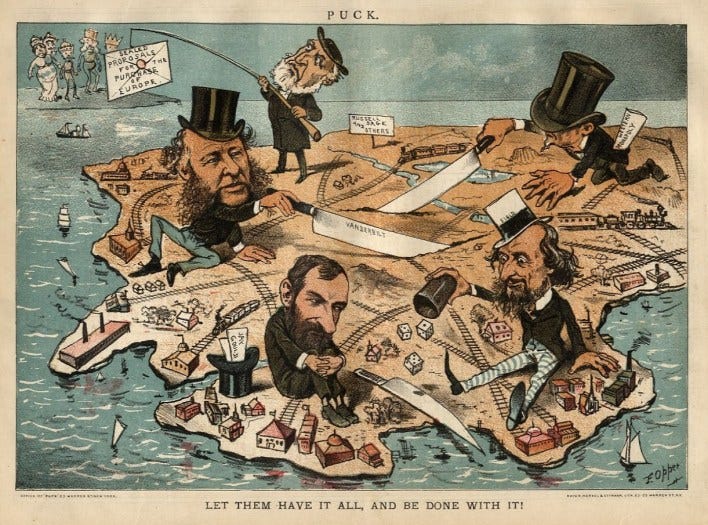The Gate: A Chestertonian Guide to Digital Freedom in the Age of Tech Oligarchs
The Digital Servile State: A Chestertonian Prophecy on Enshittification
In this most peculiar age of ours, where progress marches backward and improvements make things worse, we have stumbled upon a delightfully honest word for a dishonest thing: Enshittification. It is, perhaps, the first time in our digital century that we have called a spade a spade, or more precisely, called deterioration by its proper name, rather than dressing it up in the silk garments of "optimization" or "disruption."
The great joke of our time is that we have built magnificent digital castles in the air, only to watch them sink into the mud with mathematical precision, all while their builders proclaim they are ascending to heaven. Like medieval alchemists in reverse, our digital sorcerers have mastered the art of turning gold into lead while convincing us it is a marvelous advancement.
The truth, which stands as stark as a lamppost in London fog, is that these platforms follow the inexorable law of gravity - not upward toward the stars of progress, but downward toward the center of profit. They begin as servants to all, transform into masters of some, and end as tyrants to everyone, all while maintaining the cheerful pretense of improvement.
In naming this decay honestly, we might at last begin to see clearly through the smog of silicon sophistries.
The Digital Servile State: On the Peculiar Process of Enshittification
Being a Recently Discovered Manuscript wherein G.K. Chesterton Prophetically Addresses the Digital Age
Publisher's Note: The following manuscript was discovered in a sealed envelope marked "To be opened when men have invented a word crude enough to describe the process of making everything worse by pretending to make it better." The timing seems appropriate.
Foreword: On the Theology of Making Things Worse
It is a peculiar achievement of our modern age that we have finally invented a word sufficiently honest to describe the process by which things become worse through improvement. This word - "enshittification" - would have scandalized my Victorian contemporaries and delighted my medieval ancestors, who knew well enough that things could indeed become shit and said so with admirable directness.
The word itself represents what might be called the ultimate victory of truth over public relations. When all other words have been corrupted by marketing - that peculiar modern art of making lies sound true by making them sound scientific - only the crude words retain their meaning. A spade may no longer be called a spade, but shit, thankfully, remains shit.
Consider the remarkable theology of this process: things begin by serving man, proceed to serving themselves, and end by serving up man as the final course at their feast of profit. It is rather like a butler who begins by serving dinner, proceeds to eating dinner himself, and ends by serving you for dinner. This is what they call "disruption," though it bears a striking resemblance to what we used to call "destruction," only with better marketing.
Chapter 1: The Great Enshittification
The process of enshittification follows what might be called the universal law of digital entropy: all platforms tend toward shit, just as all ordered systems tend toward chaos. But there is something uniquely modern in the precision with which this degradation is achieved. It is not mere decay, but decay with a business model.
Consider the curious trajectory: First, they create something useful - this is the bait. Then, they make it essential - this is the trap. Finally, they make it terrible - this is the profit. The remarkable thing is not that this happens, but that we keep acting surprised when it does, rather like a man who expresses shock each time he discovers that his butler has been eating his dinner.
But perhaps the most ingenious aspect of this process is its ability to make degradation feel like upgrade. Each step toward worse is presented as a step toward better, rather like a man being led down a staircase who is continuously congratulated on his upward progress.
Chapter 2: On the Curious Art of Digital Decay
The medieval alchemist sought to turn lead into gold. Our modern digital alchemists have achieved something far more remarkable: they have discovered how to turn gold into lead while convincing everyone that they are still making gold. This is what they call "optimization," though it might more honestly be called "pessimization."
Consider the social networks, those curious modern institutions that began by connecting people, proceeded to collecting people, and ended by converting people into products. They have achieved what might be called the perfect reversal: starting as tools for human communication, they have ended as humans being tools for their communication.
Chapter 3: The Servile State Goes Digital
What my freind Hillaire Belloc warned about in "The Servile State" has not only come to pass but has done so with a precision and pervasiveness that would make the old industrialists blush with envy. The digital platforms have achieved what the factory owners could only dream of: they have made servitude voluntary and surveillance entertaining.
The curious thing about this new servility is that it comes not through chains but through convenience, not through force but through features, not through oppression but through optimization. We have created what might be called the first form of slavery that people queue up to enter, rather like a man eagerly awaiting his turn to be handcuffed.
Chapter 4: On the Mathematics of Making Things Worse
The process of enshittification follows what mathematicians might call a predictable curve: it begins with excellence, proceeds through adequacy, and arrives at awfulness with the precision of a train following its schedule. The remarkable thing is not that this happens, but that it happens with such mathematical certainty that one might set one's watch by it.
Consider the curious fact that every digital service seems to follow this same trajectory, rather like planets following their orbits. They begin by orbiting around the user's needs, proceed to orbiting around their own needs, and end by expecting the user to orbit around them. This is what they call "evolving the business model," though it might more honestly be called "revolving the business model" - for it always comes full circle to the same end.
Chapter 5: The Perfect Circle of Digital Decay
There is something almost medieval in the precision with which digital platforms follow the cycle of enshittification. Like the medieval wheel of fortune, they turn with inexorable certainty from good to bad, from useful to useless, from service to servitude. But unlike the medieval wheel, which at least had the honesty to acknowledge its circular nature, our modern platforms insist that they are moving in a straight line called "progress."
Consider the remarkable achievement of what might be called digital transubstantiation - that curious process by which something useful becomes something useless while maintaining the appearance of usefulness. It is rather like a wine that gradually turns to water while insisting it is becoming better wine.
Chapter 6: On the Curious Property of Digital Gravity
Just as physical objects fall toward the earth, digital platforms fall toward enshittification. This might be called the universal law of digital gravity - a force as constant and predictable as Newton's own. The only difference is that while physical objects fall down, digital platforms fall up - up in their metrics, up in their valuations, up in their user numbers, while simultaneously falling down in their actual utility.
The curious thing about this digital gravity is that it acts with perfect democracy - affecting all platforms equally, regardless of their initial quality or intentions. The best platform and the worst platform will, given enough time, arrive at the same destination, rather like a golden chalice and a clay pot both ending up as sherds.
Chapter 7: The Economics of Getting Worse
There is something almost admirable in the precision with which digital platforms have monetized their own degradation. They have achieved what might be called the perfect business model: making things worse while charging more for the worsening. It is rather like a restaurant that gradually reduces the size of its portions while increasing its prices, and calls this "enhancing the dining experience."
The remarkable thing is not that this happens, but that it happens with such predictable regularity that one might write a scientific paper about it - though one suspects the paper itself would gradually become worse while claiming to become better.
Epilogue: On the Hope Found in Honest Words
Perhaps the greatest hope in our age of digital decay lies in the very word Cory Doctorow invented to describe it. For in calling it "enshittification" - that magnificently honest word - we have achieved what might be called the first step toward salvation: calling things by their true names.
The medieval peasant, unlike the modern platform user, had the advantage of being able to call shit shit. We have, through the invention of this word, recovered something of that medieval clarity. And in this recovery lies what might be called the first principle of resistance: the refusal to call decay improvement, or servitude freedom, or shit gold.
For in the end, the process of enshittification can only succeed to the extent that we accept its euphemisms, believe its promises, and mistake its decay for progress. The moment we begin to call things by their true names - to call shit shit, decay decay, and servitude servitude - we begin the long journey back toward digital dignity.
And so, dear reader of the future (who is my reader of the present), I leave you with this thought: The digital age, like all ages, will pass. The question is not whether it will end, but whether we will have the honesty to describe its passing accurately. For in the accurate description of decay lies the first seed of renewal.
G.K. Chesterton
(Recently discovered manuscript, dated paradoxically from both 1912 and 2024)
The Great Inanition: A Paradox of Plenty in the Age of Going Direct In the manner of G.K. Chesterton
Google Search Pierre Omidyar , Elon Musk and Peter thiel photographed together
The Going Direct Reset: A Complete Chestertonian Tale
# The Going Direct Reset: A Complete Chestertonian Tale
Fear and Loathing in Davos: The Great Billionaire Reckoning of '24
Fear and Loathing in Davos: The Great Billionaire Reckoning of '24
IRL ≠ URL express X = QED
QED “There is life beyond the World Wide Web. Life is real and has all kinds of ambient media to carry the proof of reality. The Web isn’t real in any way, shape or form: it is merely a purveyer of brainless AI driven propaganda and censorship. I will return to this subject soon.”
QED Post Climate Change, Land Use and Monetary Policy, The New Trifecta.
Doubling Back I often find it somewhat more productive than doubling down.













